
newspapers : 1961
| home | catalogue | history | references | appendix |
 |
surfresearch.com.au
newspapers : 1961 |
|
|
|
|
|
LETTERS
| The
Australian Women's Weekly 26 April 1961, page 41. Paradise for the whole family ...
BONDI . . . perhaps the best known of
Sydney's
34 famous surfing beaches. Here, surf-board riders are seen gracefully matching their skill against the heavy rolling surf. Trove 1961 'paradise for the whole family', The Australian Women's Weekly (1933 - 1982), 26 April, p. 41. , viewed 01 Sep 2016, http://nla.gov.au/nla.news-article47493293 |
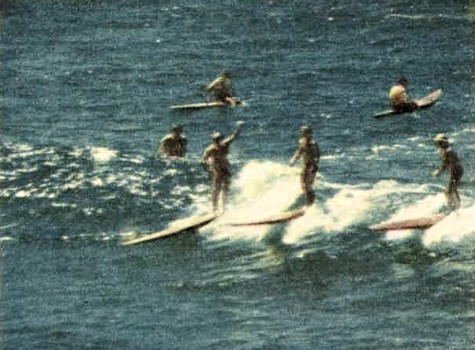 |
| The Australian
Women's Weekly 28 June 1961. Our cover
The Welsh
corgi on the surf - plane is
prize-winning Lealwen Maverick,
better known as "Brett." The
picture was taken by Peter Kinder at Currarong
Beach, near Nowra, N.S.W.
Trove 1961 'Our cover', The Australian Women's Weekly (1933 - 1982), 28 June, p. 2. , viewed 08 Sep 2016 http://nla.gov.au/nla.news-article51383684 |
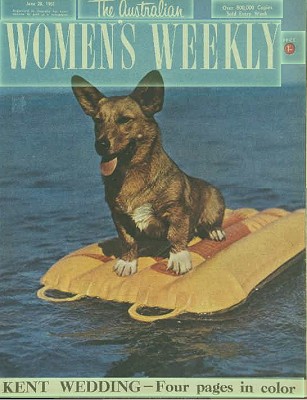 |
"DOWN THE MINE" ON SURFBOARDS
By KERRY
YATES
"Who are
these handsome surfboard champions?
Where are
these beaches?
Can I REALLY
learn to ride a board from the instructions in the book?"
These were
just a few of the questions I fired at 19-year-old Sydney
boy Lee Cross.
Lee, a
suntanned blond from Bronte Beach, had just shown me a copy
of the ''Australian Surfer," a book which he had written and
published himself.
| '"Grab your swimsuit next , Sunday
morning," he offered. ' "and we'll be off with my
surfboard to find out." So at 8 o'clock that Sunday morning Lee and some of his surfing mates called in a car, with surfboards tied on the roof to take me along on their usual weekend wave hunt. The forecast was that the best surf would be rolling on Sydney's northern beaches, M decided to start at Fairy Bower, near Manly. Travelling north to Palm Beach, we would have 16 surf beaches to choose from The boys said they would looking for "hot-dogging'' waves (long, tapering swells) on which they could "go down the mine" (ride their boards, sometimes hundreds of yards). We beeped our car horn to a passing truck with surfboard piled on top. I buttoned a heavy coat over a chunky sweater and began to feel excited about surfing on a sunny winter's day. As we crossed Sydney Harbour ... |
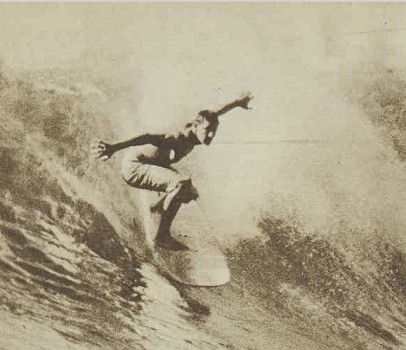 |
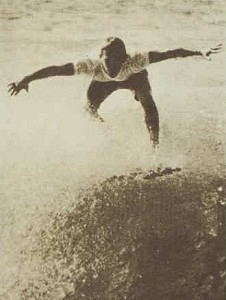 Johnny Payne, of Newport, rides toes-on-the-nose. |
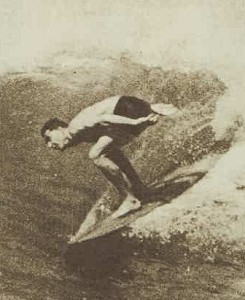 Bob Evans, of Queenscliff, ready for a "head dip" (diving off) |
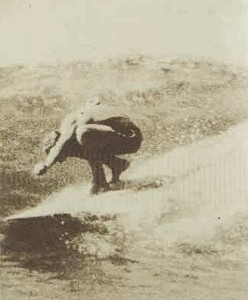 Bernard "The Midget" Farrelly doing a perfect "quasimoto." |
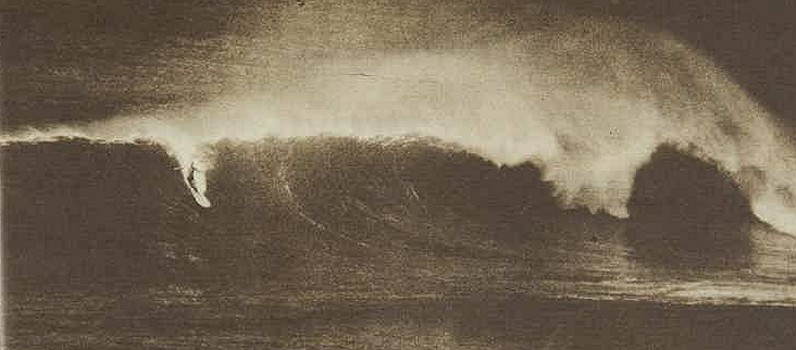 |
DAVID JACKMAN,
of Harbord, on one of the mighty waves surging over the Queenscliff bombora last June. |
Lee has
been a keen surfboard rider for four years and spends most
of his weekends and holidays riding the waves.
Since he
left high school two years ago he has worked with a North
Sydney advertising company.
He believes
that surfing should be given more encouragement as a
world-wide sport.
So Lee set
out to produce a book about the Australian surfer, the best
surfing spots, how to ride a surfboard, about the new South
Pacific Surf Riders' Club (the first successful attempt to
form a club to cater for the needs of the surfboard rider),
with pictures and news about the local champions.
And he did
just that, with the help of some of his teenage surfing
mates.
The dramatic
cover shot of a surfboard rider was taken by 17-year-old
Terry Flemming, of Bronte, a trainee photographer with the
Sydney Water Board.
Illustrations
and
jokes were drawn by an 18-year-old East Sydney Tech, art
student, David Letts, of Newport.
Lee was
telling me of his plans to bring out a second edition of the
book before the end of the year when we arrived at Fairy
Bower.
One of the
"Bower Boys" filed that the "waves were on"and the surf was
"too much" (his term for fabulous).
We raced to
the top of a cliff overlooking the spot where the boards
were starting their journey "down the mine," about a mile
off Manly Beach.
The surf
looked wild and rough, but the boys had it mastered, and the
champs of this area, like "Nipper" Williams, Bob Pike, and
Glen Richie (all pictured in the book), dared to ride with
no fear of hitting the craggy stone bottom.
We were off
again, giving Manly a miss, and were heading for a closer
view of the Queenscliff bombora.
The great
bombora, where the sea surges over seven layers of rock,
nearly two miles out from North Steyne Beach, thunders in a
big sea.
lt has been
conquered by only a handful of boys, including 21-year-old
Dave Jackman, of Freshwater.
Three months
ago "Jacko" successfully cracked four of the mighty bombora
waves.
(See picture
above.)
Northwards
again, we passed Freshwater, Curl Curl, Deewhy, and Long
Reef without stopping.
The surf was
too big and there was danger of losing surfboards, which
would go crashing against the rocks and so "ding" (a bang
which splits the fibreglass on a surfboard) badly.
The boys
told me that Long Reef usually supplies the works-
everything from 3ft. to 30ft. waves.
The top man
among some mighty locals of this area is Peter Clare, the
senior surfboard champion for 1961.
The Collaroy
boys were really "hot-dogging" on "Pitt Street" shoots
(waves with five or six riders catching them), but we were
orķ to find where the surfboard riders from the south side
had "camped" for the day.
We didn't
have to go far.
As we
reached the sands of North Narrabeen we could see cars,
surfboards, and riders, and we knew that this was THE beach
for the best surf.
Shark scare
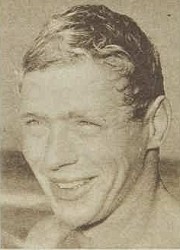 |
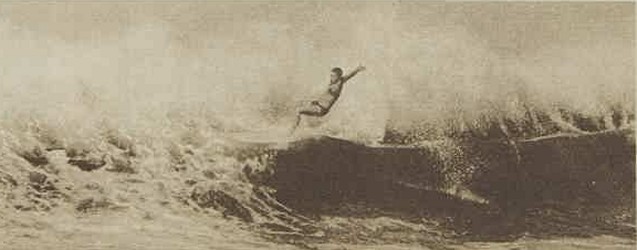 |
| The Cumberland
Argus Parramatta, 20 December 1961, page 19. GRACE BROS.
TroveRIDE THE WAVES With a FERRIS SURF BOARD Special 'Christmas Gift BALSA SURF BOARD Fibreglass Covering £29/17/6 SPECIAL! 3'6' BOARDS £14/10/- 1961 'Advertising', The Cumberland Argus (Parramatta, NSW : 1950 - 1962), 20 December, p. 19. , viewed 01 Sep 2016, http://nla.gov.au/nla.news-article131328672 |
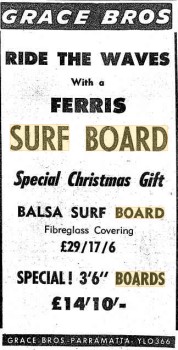 |
| The
Australian Women's Weekly (Teenagers Weekly) 11 October 1961, page 3. How to ride a surfboard
By KERRY YATES This popular sport is a mystery to many - so, here's . . . TIPS FOR
BEGINNERS
WHY don't you,
too, join in the fun?
Don't say, "I couldn't do it." You could, quite easily. |
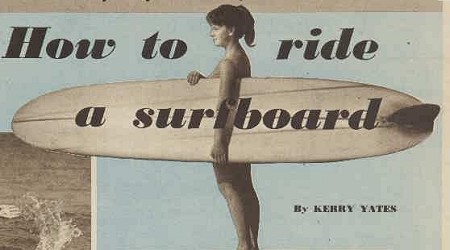 |
|
STEP ONE: Kneel or
lie (whichever you prefer) on your
surfboard so that it floats level in the water. Paddle out, swinging both arms together, beyond the breaking waves.  STEP THREE: Making
sure that your surfboard is moving
with the wave, slowly rise to your feet (about three-quarter way back from the nose of the board) in one movement.  |
STEP TWO: To
"crack" your first wave, lie flat.
Let the first wave go by. When the second is about 20ft. behind start paddling until you feel the swell lifting you along. 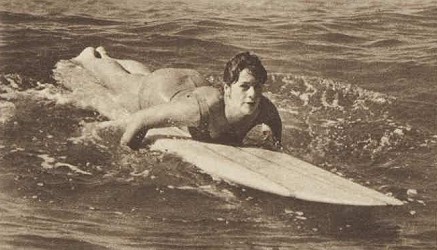 FOUR:
Bend your knees -slightly, one foot in front of the
other, and lift your arms to the sides.
Try to lean a little forward and let the board make its own way to shore. 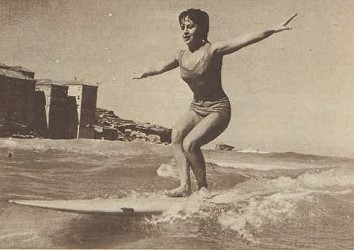 |

|
|
|
|
|

| home | catalogue | history | references | appendix |